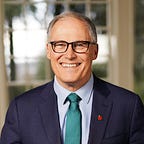Washington “goes big” on housing in 2023
From Vancouver to Bellingham and Pullman to La Push, the cost of housing has soared. In the last decade, one million new residents arrived while only one-quarter as many homes went up. When demand exceeds supply, prices rise. Rise they have.
Rents are up. Prices are up. Accordingly, homelessness is up. And too many families are just a paycheck away from trouble.
To begin the 2023 legislative session, Gov. Jay Inslee encouraged the Legislature to “go big” to meet the scale of the housing crisis. On Monday, the governor and lawmakers gathered to sign a slate of housing-related bills to clear obstacles to housing construction and right historic wrongs related to housing discrimination.
At a later date, the governor will sign a budget that allocates more than $1 billion over the next biennium to address homelessness and affordable housing.
Thawing urban zoning frozen in time
Seattle neighborhoods lined with craftsman-style homes and blossoming cherry trees paint a pretty picture. But for those on the outside, a white picket fence can look like barbed wire as the city’s median home price teases the million-dollar mark.
The Seattle area’s population has boomed by 30% since 2000, but its housing stock has not. Much of the city’s buildable land has been frozen in time, reserved for only single-family homes. The City of Lakewood’s annual housing report notes that small single-family homes are built at just 20 percent of the rate they were built in the 1970s. In Leavenworth, the income necessary to buy a “bottom-tier” home is 111% of the county median family income. Building more single-family homes requires building out, something there’s just not room to do anymore within city limits statewide.
“The bills we’re signing today are blocks in a foundation that will help us build more, and smarter, housing,” said Inslee. “The old white picket fence looks an awful lot like barbed wire for people priced out. But today we’re breaking barriers and helping Washingtonians find their way home.”
A new middle housing bill passed by the Legislature may allow more housing to bloom. Up to four units may now be built on lots presently zoned for single-family housing in certain cities. Another new law will permit more accessory dwelling units. The laws will encourage gentle densification of urban neighborhoods without expense to their character or curb appeal.
Cities like Tacoma and Spokane have already experimented on their own with upzoning. Each year, more and more construction sites are popping up with two or more units planned for a single lot. Over time, the statewide policy will help maximize buildable land in Washington’s hottest markets, promoting smart density and improving inventory to reign in runaway prices.
Tenant rights & historic wrongs
The Legislature took on procedural injustices this session that some landlords have wielded at their tenants’ expense.
A new law offers some technical changes to eviction procedures to improve tenant participation and affords tenants more time to make payments with emergency rental assistance funds or stay an eviction order. The bill was sponsored by Sen. Patty Kuderer.
Another law discourages abuses of damage deposits, requiring landlords to substantiate damages and prohibiting the assessment of damages for ordinary maintenance. Carpet cleaning costs, for example, may not be withheld from a damage deposit. The bill was sponsored by Rep. My-Linh Thai.
Discriminatory real estate covenants pervaded until 1960 in Washington state, excluding people of certain races, religions, and ethnicities. A new law establishes a covenant homeownership account to account for that history and assist aspiring homebuyers still affected by its lingering legacy. Inslee and Rep. Jamila Taylor, the bill’s prime sponsor, hosted a special signing event for the bill Monday at the Northwest African American Museum.
“The deliberate and harmful barriers preventing Black homeownership impact intergenerational wealth and housing security. Because this racial discrimination was targeted, the solution must also be targeted,” said Taylor.
Researchers from the University of Washington found more than 40,000 examples within the state of racist neighborhood covenants that excluded people of color. A report commissioned by the state Department of Commerce revealed astonishing disparities in homeownership across races: people of color were 19% likely to own a home compared to their white neighbors with similar incomes. Over the decades, the harmful effects of racist policies have become clear.
That’s what makes Taylor’s bill a “focused solution.” The bill intends to root out antique racist covenants and plant something healthy: an account to help Washingtonians from long-oppressed groups buy their first home.
“Covenants like this haven’t been in effect since 1960, but they’ve still been poisoning us since the day they were written,” said Inslee. “And this bill is doing the right thing.”
Cutting red tape
Costs and labor and materials all factor in housing construction, and often paperwork proves to be a confounding variable. The Legislature began the session determined to relieve some regulatory burdens to help homebuilders get to home-building.
Local design review processes occasionally wandered into the subjective and introduced delays to housing projects. ESHB 1293, sponsored by Rep. Mark Klicker, now requires cities and counties under the Growth Management Act to apply only clear and objective design review standards so that developers can design to plain and consistent requirements.
Another new law consolidates local permit review processes. A single housing project may involve a bevy of permits, and the new law holds local jurisdictions to reasonable deadlines and other requirements so that construction stays on schedule. The bill was sponsored by Rep. Mark Mullett.
“Going big”
This session also saw historic investments to reduce homelessness and build more housing. The budget to be signed later this month includes hundreds of millions of dollars to support rental assistance, homeownership programs, and more. Additional funds will support encampment response and youth homelessness prevention.
As ratcheting housing costs weigh on countless Washington families, the Legislature passed policies and investments commensurate to the moment. They heard the governor, and they “went big.”
